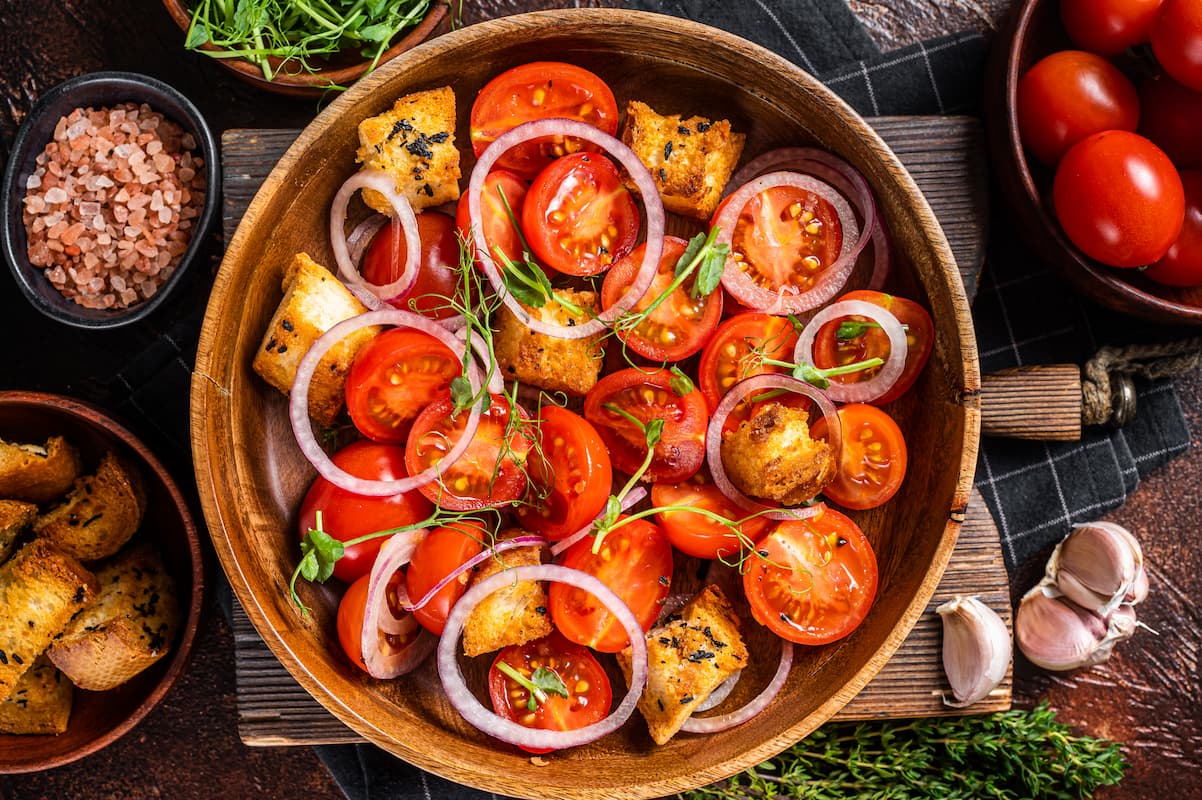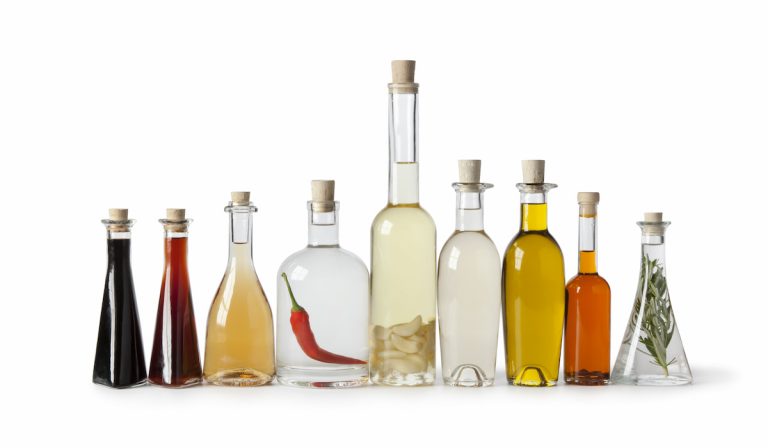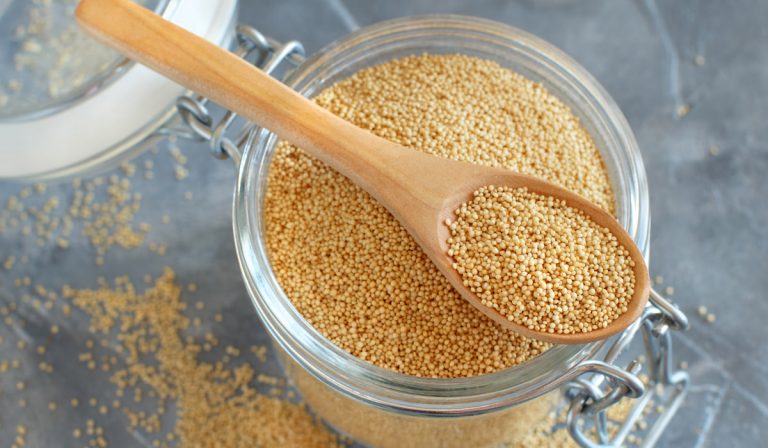Are Tomatoes Paleo? (Is Canned Tomato Puree Paleo?)
People sometimes refer to tomatoes as vegetables, even though they are actually fruits. But there is no issue with this mix-up. Whether you call them a fruit or a vegetable, tomatoes are very beneficial to one’s diet. However, are tomatoes paleo-friendly? Find out below.
Are tomatoes paleo?
Tomatoes are paleo. They are one of many fruits humans of the paleolithic era ate—albeit ancient tomatoes were smaller than modern tomatoes.
While tomatoes are paleo-friendly, you should avoid adding them to your paleo diet if you react to any plant from the nightshade family.

Below, we discuss more on the inclusion of tomatoes in paleo diets. We also talk about the health benefits of tomatoes you should know and more.
Tomatoes and the Paleo Diet
Tomatoes have been a staple since the paleolithic era. So, for sure, they are paleo. Of course, there might be some differences between ancient tomatoes and the tomatoes of today; ancient tomatoes were possibly tarter tasting and smaller than modern tomatoes. But since modern tomatoes still have a low glycemic index, they are paleo-friendly.
Obviously, if a food item is paleo, it is most likely beneficial to your health. So, the inclusion of tomatoes in your diet should do your body a lot of good.
While tomatoes are very nutritious and paleo-friendly, you should avoid including them in your diet if you have tomato or nightshade allergy. In other words, if you react to tomatoes or any plant from the nightshade family, do not eat tomatoes.
But then, such allergies are pretty rare. So, you are unlikely to suffer from it. Still, if you have had any reaction while eating plants like potatoes, peppers, or eggplant, seek clarity from a physician.
Tomato fruits are healthy, as we have said. However, unripe tomatoes and other green parts of a tomato plant are toxic. These parts of a tomato plant contain sufficient solanine to cause poisoning in humans. So, if you consume them, you will most likely suffer solanine poisoning.
Solanine poisoning causes various signs and symptoms, including fever, hypothermia, diarrhea, vomiting, nausea, slow pulse, respiratory distress, and stomach pain.
In severe cases, it can lead to unconsciousness and death. So, avoid the green parts of a tomato plant completely.
Is Canned Tomato Puree Paleo?
The answer to this depends on the overall content of the can. But generally, if all the canned tomato puree contains is tomato, it is paleo. However, if the tomato puree contains other ingredients like sugar and preservatives, it is not paleo.
As you may already know, sugar is off-limits in a paleo diet. Preservatives are artificial compounds and were unavailable during the paleolithic era.

What Nutrients Are in Tomatoes?
A 100-gram serving of tomatoes contains the following nutrients:
Carbohydrate
In 100 grams of tomato, you will get around 3.9 grams of carbohydrates. Of the 3.9 grams of carbs, 2.6 grams are sugar. So, it is not surprising that the glycemic index of tomatoes is as low as 15.
Protein
Tomatoes are not rich in protein. You get only around 0.9 grams of protein in a 100-gram serving.
Fat
Tomatoes are also low-fat. They contain only around 0.2 grams per 100 grams.
Fiber
About 1.2% of tomatoes is fiber. So, if you are taking in a 100-gram serving, you will get around 1.2 grams of fiber, which is good for your digestive health.
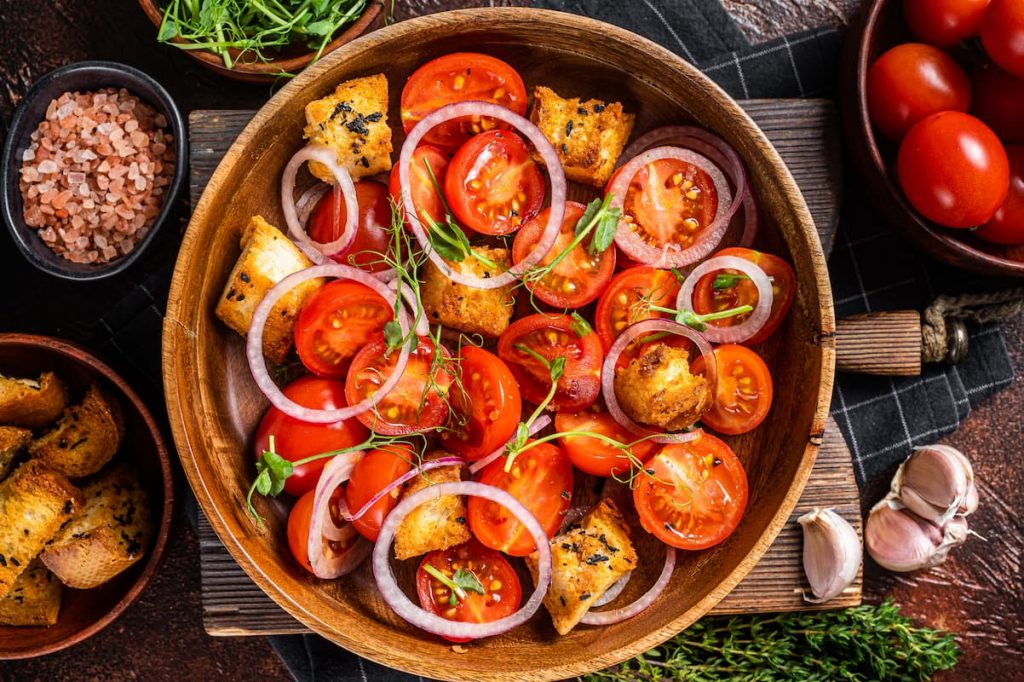
Lycopene
Lycopene is a carotenoid that gives tomatoes their red color. But beyond giving tomatoes color, lycopene is a potent antioxidant.
Potassium
You should get around 210 mg of potassium in 100 grams of tomatoes.
Vitamin A
You can get up to 750 IU of vitamin A in 100 grams of tomatoes. This amount equals around 15% of the daily value of vitamin A.
Vitamin C
Besides lycopene, tomatoes contain other antioxidants, one of which is vitamin C. Tomatoes offer around 28% of the daily value of vitamin C.
Folate
The amount of folate in 100 grams of tomatoes ranges from around 4.1 to 35 mcg. This means you can get about 1-9% folate daily value in tomatoes.
How Do Tomatoes Benefit Your Health?
Digestive Health
Most of the fibers in tomatoes are insoluble. So, with tomato consumption, you are less likely to suffer constipation. Also, insoluble fibers help improve insulin sensitivity. So, it might just be helpful in diabetes management.
Source of Antioxidants
Tomatoes contain lycopene and vitamin C—two potent antioxidants. The antioxidant actions of these substances can help improve the activities of the immune system.
Beyond that, they can help prevent fat oxidation in the blood. As a result, they reduce the likelihood of inflammation and plaque formation, reducing the risk of heart diseases.
By nullifying free radicals, lycopene and vitamin C can mitigate the effects of aging, improve skin health, improve bone health, and do much more.
Tissue Health
The vitamin C content of tomatoes can promote wound healing and repair damaged tissue. It can also improve gum health.
Vitamin C may also promote the production of anti-stress hormones.
Heart Health
Because tomatoes contain potassium, they might be helpful in blood pressure regulation. They can also help regulate the balance of your body’s fluid system. The potassium content of tomatoes might also help to prevent heart diseases.
Beneficial to a Pregnant Woman and the Fetus
If you are pregnant, you and your growing baby might benefit from the folate content of tomatoes. Folate promotes cell growth, and it is pretty vital in pregnancy—especially in the first trimester.
Low-Carb and Low-Fat
Tomatoes are low in carbohydrates and fat. So, you can incorporate them into your weight loss diet.
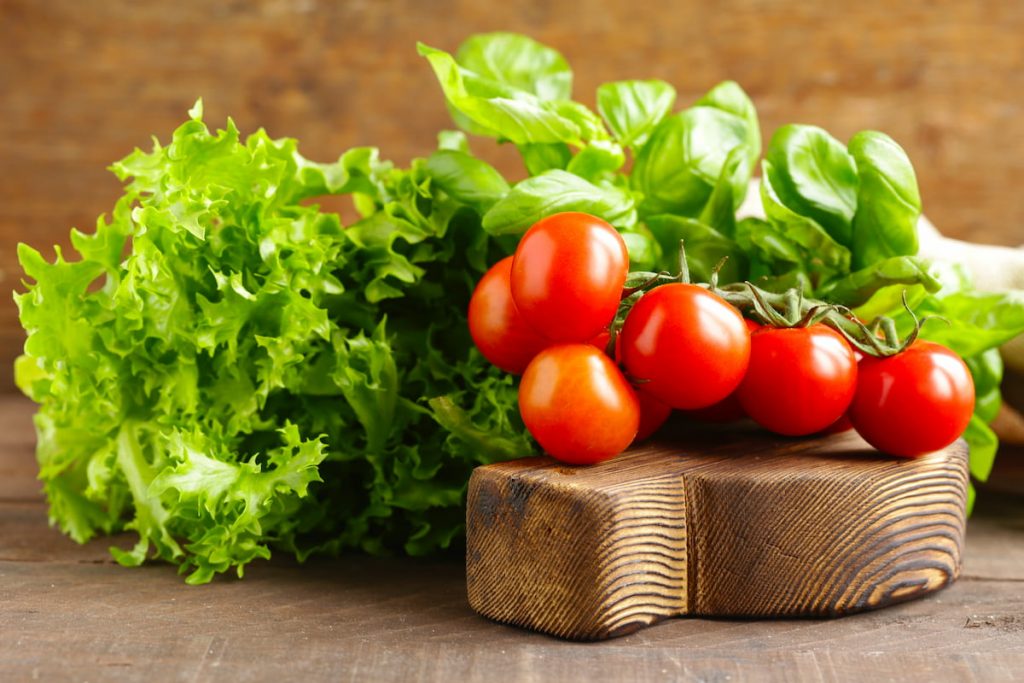
Potential Toxic Effects of Tomatoes
Allergy
As we previously mentioned, albeit rare, it is possible to have a tomato allergy. And if you do, you should avoid eating tomatoes.
Besides tomato allergies, if you react to any plant from the nightshade family, you should avoid tomatoes. In place of tomatoes, you can use beets or carrots.
Leaky Gut
Tomatoes contain a protein called lectin. Lectin promotes the clumping of macromolecules in the body, including bacteria and viruses. Of course, by causing bacteria and viruses to clump together, lectin can leave you prone to infections.
Beyond leaving you prone to infections, lectin can cause leaky gut syndrome. Leaky gut syndrome is a condition in which proteins, bacteria, and toxins leak into the bloodstream from the small intestine.
Leaky gut syndrome is typically not diagnosable on its own. However, it is usually associated with various conditions, including diabetes, Crohn’s disease, irritable bowel disease, PCOS, and celiac disease.
If you do not have leaky gut syndrome, consuming tomatoes should be no problem.

Saponin Poisoning
As we already explained, if you consume unripe tomatoes or any green part of a tomato plant, you may suffer saponin poisoning. So, as long as the tomato fruit is ripe, this should be no problem.
Summary
Tomatoes are paleo and very healthy. Canned tomato purees are also paleo if they do not contain a non-paleo ingredient like sugar or preservatives. While tomatoes are healthy and paleo, you should avoid them if you have a tomato allergy, nightshade allergy, or leaky gut syndrome.
Resources
- https://www.nationalgeographic.com/culture/article/prehistoric-dining-the-real-paleo-diet
- https://www.medicalnewstoday.com/articles/317112
- https://www.hortidaily.com/article/6004477/are-the-green-parts-of-the-tomato-really-toxic/
- https://paleoliving.org/are-tomatoes-paleo/
- https://www.canr.msu.edu/news/solanine_poisoning_how_does_it_happen
- https://www.everydayhealth.com/diet-nutrition/paleo-diet/detailed-paleo-diet-food-list-what-eat-avoid
- https://paleogrubs.com/paleo-diet-food-list
- https://www.ndtv.com/food/diabetes-management-heres-how-tomatoes-may-help-manage-blood-sugar-levels-1931826
- https://www.healthline.com/nutrition/foods/tomatoes
- https://pubmed.ncbi.nlm.nih.gov/11192026
- https://pubmed.ncbi.nlm.nih.gov/19449809
- https://paleoleap.com/paleo-foods-tomatoes/
- https://www.medicalnewstoday.com/articles/326117

